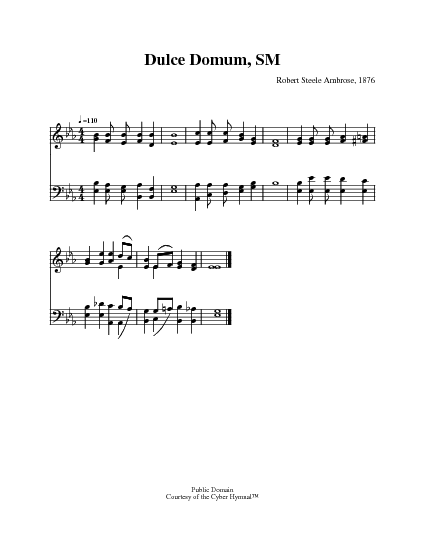- |
User Links
One Sweetly Solemn Thought

One sweetly solemn thought (Cary)
Author: Phoebe Cary (1852)Published in 714 hymnals
Printable scores: PDF, MusicXMLAudio files: MIDI
Representative Text
1 One sweetly solemn thought
Comes to me o’er and o’er;
Nearer to my home today am I
Than e’er I’ve been before.
2 Nearer my Father’s house,
Where many mansions be;
Nearer, today, the great white throne,
Nearer the crystal sea.
3 Nearer the bound of life,
Where burdens are laid down;
Nearer to leave the heavy cross,
Nearer to gain the crown.
4 Father, perfect my trust!
Strengthen my power of faith!
Nor let me stand, at last, alone
Upon the shore of death.
AMEN.
Source: The A.M.E. Zion Hymnal: official hymnal of the African Methodist Episcopal Zion Church #558
Author: Phoebe Cary
 Phoebe Cary, (1824-1871) was born and raised in Mount Healthy in Hamilton County, Ohio. Her family came from Lyme, New Hampshire to Ohio when her grandfather was given land in return for his service in the Continental Army. She was the younger sister of Alice Cary (1820-1871). She and Alice submitted poetry to religious periodicals. Phoebe remained in Ohio and continued to write many hymns, including, "One sweetly solemn thought."
Mary Louise VanDyke… Go to person page >
Phoebe Cary, (1824-1871) was born and raised in Mount Healthy in Hamilton County, Ohio. Her family came from Lyme, New Hampshire to Ohio when her grandfather was given land in return for his service in the Continental Army. She was the younger sister of Alice Cary (1820-1871). She and Alice submitted poetry to religious periodicals. Phoebe remained in Ohio and continued to write many hymns, including, "One sweetly solemn thought."
Mary Louise VanDyke… Go to person page >Text Information
| First Line: | One sweetly solemn thought (Cary) |
| Title: | One Sweetly Solemn Thought |
| Author: | Phoebe Cary (1852) |
| Meter: | 6.6.8.6 |
| Language: | English |
| Copyright: | Public Domain |
One sweetly solemn thought. Anticipation of Heaven. This piece was not intended for public use, nor is it a suitable metre for musical treatment, yet it has won universal acceptance and popularity. In some instances this has been attained by change of metre as in the Supplement to the Baptist Psalms & Hymns 1880, No. 1185. Johnson's Encyclopedia is in error in saying it was "written at the age of 17." The Congregational Quarterly for Oct., 1874, says, "it was written, she tells us, in the little back third story bedroom, one Sabbath morning in 1852, on her return from church." This statement shows that it was composed when she was 28, and not 17. The popularity of the hymn in Great Britain arose mainly through its use in the Evangelistic services of Messrs. Moody and Sankey. In the Protestant Episcopal Hymns for Church and Home, Phila., 1860, No. 383, it is given as "A sweetly solemn thought." [Rev. F. M. Bird, M.A.]
--John Julian, Dictionary of Hymnology (1907)
Notes
One sweetly solemn thought. Anticipation of Heaven. This piece was not intended for public use, nor is it a suitable metre for musical treatment, yet it has won universal acceptance and popularity. In some instances this has been attained by change of metre as in the Supplement to the Baptist Psalms & Hymns 1880, No. 1185. Johnson's Encyclopedia is in error in saying it was "written at the age of 17." The Congregational Quarterly for Oct., 1874, says, "it was written, she tells us, in the little back third story bedroom, one Sabbath morning in 1852, on her return from church." This statement shows that it was composed when she was 28, and not 17. The popularity of the hymn in Great Britain arose mainly through its use in the Evangelistic services of Messrs. Moody and Sankey. In the Protestant Episcopal Hymns for Church and Home, Phila., 1860, No. 383, it is given as "A sweetly solemn thought." [Rev. F. M. Bird, M.A.]
--John Julian, Dictionary of Hymnology (1907)
Timeline
Media
- MIDI file from Alexander's New Revival Hymns: as used at the Torrey-Alexander meetings #94
- MIDI file from Calvary Songs #135
- MIDI file from The Cyber Hymnal #5235
- MIDI file from Fair as the Morning. Hymns and Tunes for Praise in the Sunday-School #76
- MIDI file from Gloria Deo: a Collection of Hymns and Tunes for Public Worship in all Departments of the Church #481
- MIDI file from Pearls of Praise #158
- MIDI file from Songs of the Kingdom: prepared for the use of young people's societies and adapter for prayer meetings, Sunday schools and the home #150
- MIDI file from Triumphant Songs No.1 #26
- MIDI file from Triumphant Songs No.2 #201
- MIDI file from Timeless Truths #573


 My Starred Hymns
My Starred Hymns

